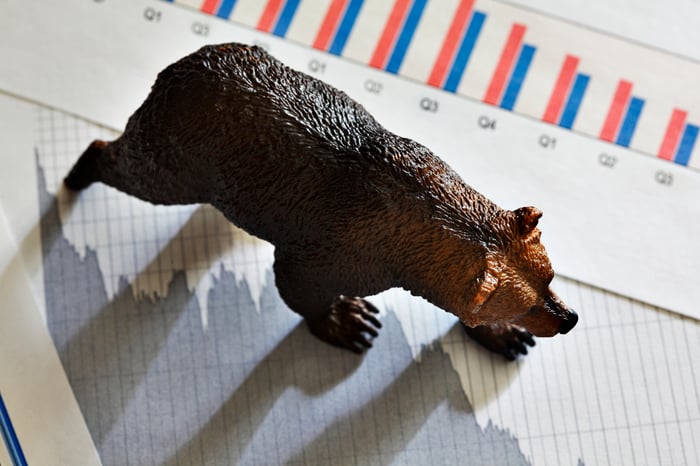It can sometimes be a painful realization, but stock market crashes, corrections, and bear markets are a normal part of the investing cycle. Investors young and old were reminded of this last year, with all three major U.S. stock indexes plunging into a bear market.
While it can occasionally be difficult to pinpoint why the stock market declines, the Federal Reserve certainly deserves its fair share of the blame for the current bear market. In hindsight, the nation's central bank left interest rates at or near historic lows for far too long. When coupled with quantitative easing measures, such as long-term bond buying to keep rates low, it's easy, and arguably correct, to lay blame on the Fed.

Image source: Getty Images.
But when there's pain on Wall Street, there's usually an opportunity for long-term investors to pounce. No matter how badly the nation's central bank errs with its policy, equity valuations tend to rise over the long run.
What follows are three of the smartest stocks to buy in a Fed-induced bear market.
CrowdStrike Holdings
The first genius buy in a bear market fueled by the nation's central bank is cybersecurity stock CrowdStrike Holdings (CRWD 2.30%). Even though high-growth companies with premium valuations, like CrowdStrike, have been given a swift kick in the pants by the current bear market, there are well-defined competitive advantages that make this a solid buy-the-dip candidate.
One reason to appreciate cybersecurity stocks is the evolution of the industry into a basic necessity service. Hackers and robots don't care if the U.S. economy is struggling or if Wall Street has a bad day. They want to steal sensitive business and consumer data at all times. With businesses shifting more of their critical data online and into the cloud in the wake of the pandemic, it means the onus of protecting this information is increasingly falling to third-party providers like CrowdStrike.
CrowdStrike is, arguably, the premier name in end-user protection -- and it's all thanks to Falcon. Falcon is the company's artificial intelligence (AI)-driven security platform responsible for overseeing trillions of weekly events. Every single event makes Falcon smarter, which allows it to efficiently respond to potential threats.
To be perfectly clear, there are cheaper software-as-a-service (SaaS) options in the cybersecurity space. Despite this, the company's gross retention rate has climbed more than 400 basis points since fiscal 2018 to top 98%. As CrowdStrike has shown with its operating results, businesses will pay more for a quality product.
But what might be even more impressive is the company's organic growth rate. While it's had no issue gaining new subscribers -- 450 by the end of fiscal 2017 to 21,146 by the third quarter of fiscal 2023 -- what's jaw-dropping is that three out of five clients have purchased five or more cloud module subscriptions. In roughly five years, this figure climbed from a single-digit percentage to 60%. Add-on sales are vital to boosting the company's operating margin and may allow earnings growth to outpace revenue growth for the foreseeable future.
Bank of America
Another no-brainer buy in a Fed-induced bear market is money-center giant Bank of America (BAC 2.06%).
Under normal circumstances, bank stocks would be off-limits during a bear market. When the going gets tough, the Fed usually lowers interest rates, which has a tendency to reduce the net-interest, income-earning potential of banks. It's also normal for bank loan losses to rise when the U.S. economy weakens. However, these aren't "normal circumstances."
With the nation's central bank rapidly raising interest rates to tackle historically high inflation, bank stocks are benefiting. During the fourth quarter, Bank of America (BofA) recognized $14.8 billion in net-interest income, which was a $3.3 billion improvement from the comparable quarter in 2021. What's more, BofA estimates that a 100 basis-point parallel shift in the interest-rate yield curve will net the company $3.8 billion in added net-interest income over 12 months. Long story short, the benefit of higher rates for banks should more than offset the negatives associated with rising loan losses.
Bank of America's digital transformation continues to take shape as well. As of the end of 2022, 73% of its 56 million verified online users were active customers and 49% of total loan sales were being completed online or via mobile app. The reason banks have pushed consumers to use online banking and mobile apps is because digital transactions cost just a fraction of what in-person interactions run. The more digital transactions that are undertaken, the more likely it is that BofA can consolidate some of its branches and operate even more efficiently.
Bank stocks are also able to take advantage of disproportionately long periods of economic expansion. Recessions may be inevitable, but they're usually short-lived. What makes banks moneymakers is their focus on increasing loans and deposits, and building off this bread-and-butter strategy over many years, if not decades.
At just 9 times Wall Street's forward-year earnings consensus, BofA is a treat for value investors.

Berkshire Hathaway CEO Warren Buffett. Image source: The Motley Fool.
Berkshire Hathaway
The third stock that makes for a smart buy during a Fed-induced bear market is conglomerate Berkshire Hathaway (BRK.A 0.99%) (BRK.B 0.91%).
By itself, Berkshire Hathaway isn't a household name, but its CEO certainly is. Billionaire Warren Buffett has been steering the ship since 1965 and has overseen more than $680 billion in value creation for shareholders. Though past performance isn't indicative of future results, Buffett delivering an average annual return of 20.1% over 57 years, which compares to a 10.5% total return, including dividends, for the S&P 500 over the same stretch, suggests he knows his way around Wall Street.
Aside from having a phenomenal CEO, three additional factors make Berkshire Hathaway a wise buy during a bear market. To begin with, the company's investment portfolio is packed with dividend stocks. Berkshire is on pace to collect more than $6 billion in dividend income this year, with over $4.8 billion coming from just a half-dozen stocks. Dividend-paying companies are usually profitable, and they have a knack for handily outperforming non-dividend-paying stocks over the long run.
The Oracle of Omaha and his team also fancy owning cyclical stocks. While this does leave Berkshire susceptible to potential weakness during short-lived recessions, it also sets the company up to take advantage of those aforementioned "disproportionately long periods of economic expansion." It's no surprise that Bank of America is Warren Buffett's second-largest holding in Berkshire Hathaway's investment portfolio.
Lastly, investors get the benefit of a deceptively impressive capital-return program. Although Buffett's company doesn't pay a dividend, the Oracle of Omaha and his right-hand man Charlie Munger have OK'd the repurchase of more than $63 billion worth of Berkshire Hathaway stock since July 2018. Buying back stock for a company with steadily growing net income can increase earnings per share and make it that much more fundamentally attractive to value investors.
Berkshire Hathaway is a company that's built to outperform in virtually any economic environment.


